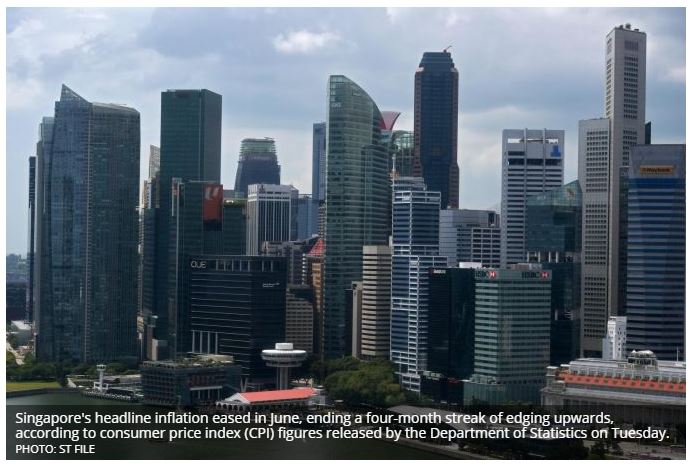Singapore headline, core inflation weaken in June
SINGAPORE’S headline inflation eased in June, ending a four-month streak of edging upwards, according to consumer price index (CPI) figures released by the Department of Statistics on Tuesday. Core inflation also continued to ease, strengthening economists’ expectations of monetary easing ahead.
Headline inflation was 0.6 per cent year on year, down from 0.9 per cent in May and below economists’ expectations of 0.8 per cent. This was due to lower private road transport, services and retail inflation, as well as a larger decline in costs of electricity and gas and accommodation.
Private road transport costs edged up 0.2 per cent, slower than the 1.5 per cent rise the previous month. Accommodation costs fell 1.1 per cent, slightly faster than May’s 1 per cent pace.
Core inflation, which strips out accommodation and private road transport costs, edged down to 1.2 per cent year on year, in line with economists’ expectations and down from 1.3 per cent in May.
Services inflation eased to 1.7 per cent in June, down from 2 per cent in May. Retail inflation also slowed to 0.4 per cent, from 0.5 per cent in May.
The cost of electricity and gas fell 4.8 per cent, steeper than May’s 4 per cent fall, as the nationwide rollout of the Open Electricity Market continued to dampen electricity prices.
Food inflation stayed unchanged at 1.4 per cent, with an uptick in food services inflation broadly offsetting a smaller increase in the prices of non-cooked food items.
The Monetary Authority of Singapore (MAS) and the Ministry of Trade and Industry (MTI) maintained their 2019 inflation outlook, continuing to expect core inflation to come in near the mid-point of the forecast range of 1 to 2 per cent, and headline inflation to average 0.5 to 1.5 per cent.
But Maybank economists Chua Hak Bin and Lee Ju Ye expect the MAS to downgrade this full-year forecast, to a range of zero to 1 per cent instead. The economists themselves have lowered their 2019 forecasts, now expecting headline inflation of 0.7 per cent — down from their previous 1.2 per cent estimate — and core inflation at 1.2 per cent, down from 1.4 per cent.
MAS and MTI said that for the rest of the year, external sources of inflation “are likely to be benign”. At home, labour market conditions have largely held up and will support moderate wage increases, but an acceleration in inflationary pressures is unlikely given Singapore’s slower economic growth, global uncertainties, and the continuing restraining effects of monetary policy tightening in 2018.
Citi economists Kit Wei Zheng and Ang Kai Wei noted that although the official forecasts stayed the same, labour market conditions were no longer described as having “remained firm”. Earlier expectations for food prices to “pick up slightly on average” had also been dropped.
A downgrade to the official core inflation forecast would still be key for the MAS to ease monetary policy at its next policy meeting in October, argued the Citi economists. “Any softening of the job market and/or collapse in oil prices would provide clearer triggers for easing,” they added.
Following the recent release of flash figures that showed second-quarter growth nearly flat at 0.1 per cent, other economists have already begun to expect the MAS to ease monetary policy in October.
Noting last week’s weak non-oil domestic exports data and Tuesday’s CPI data showing continued moderation in core inflation, ANZ head of Asia research Khoon Goh maintains his view of a 50 basis point (bp) slope reduction of the exchange rate policy band in October, “though an earlier intra-meeting move cannot be ruled out”. He sees core inflation coming in at the lower end of the official forecast range instead.
Barclays economist Brian Tan similarly expects core inflation to average 1.1 per cent for 2019, and for the policy band slope to be reduced by 50 bp. He added: “The risks have shifted, in our view, towards the MAS easing even more aggressively than this. Potentially, the MAS could reverse all of its FX (foreign exchange) policy tightening from last year and reduce the slope to zero per cent, especially if the Q3 GDP (gross domestic product) reading implies a technical recession, which is not our base case but cannot be ruled out.”
Source: https://www.businesstimes.com.sg/government-economy/singapore-headline-core-inflation-weaken-in-june


 English
English




